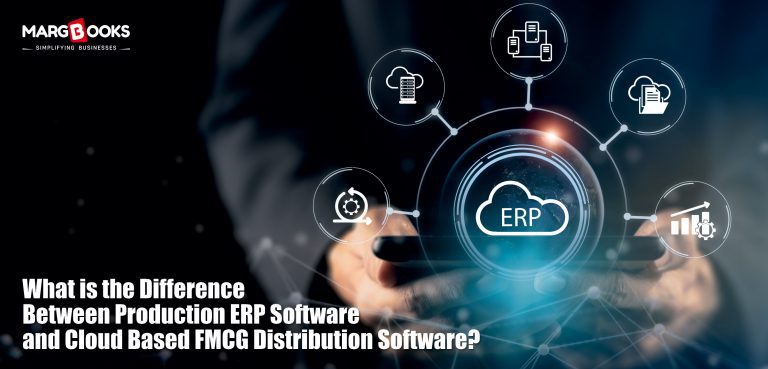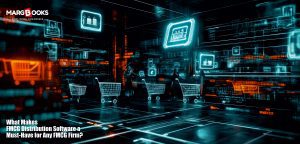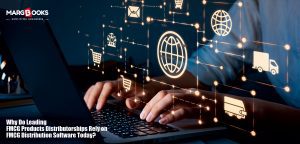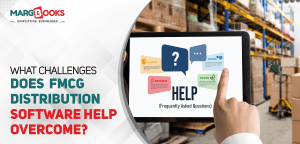The business world has seen massive technological strides in recent years, especially in industries like FMCG (Fast-Moving Consumer Goods). To stay ahead of the competition, companies in this sector are increasingly relying on Production ERP Software and Cloud-Based FMCG Distribution Software to streamline their operations, improve efficiency, and enhance customer satisfaction. But how are these two types of software different, and why are they important for modern businesses?
In this blog, we will explore the differences between Production ERP Software and Cloud-Based FMCG Distribution Software, and why companies like MargBooks are leveraging these tools to optimise their operations.
What is Production ERP Software?
Production ERP Software (Enterprise Resource Planning) is a comprehensive solution that integrates and manages all aspects of a company’s production processes. It is designed to optimise manufacturing workflows, inventory management, supply chain operations, and overall production efficiency. Essentially, it centralises data from various departments to provide a holistic view of the production cycle, helping businesses make informed decisions.
Key Features of Production ERP Software:
- Manufacturing Planning: Helps plan, schedule, and monitor the entire production process.
- Inventory Management: Tracks raw materials, semi-finished goods, and finished products to ensure optimal stock levels.
- Procurement Management: Automates the process of ordering raw materials and supplies to avoid shortages or excess stock.
- Quality Control: Ensures that the products meet quality standards at every stage of production.
- Cost Control: Tracks production costs, helping businesses reduce waste and improve profitability.
What is Cloud-Based FMCG Distribution Software?
On the other hand, Cloud-Based FMCG Distribution Software is designed specifically for managing the distribution processes in the FMCG sector. The key difference between this and Production ERP Software is that Cloud-Based FMCG Distribution Software focuses primarily on streamlining the entire distribution lifecycle—from inventory management to order fulfilment and delivery. Being cloud-based, it offers the flexibility of real-time access from anywhere, anytime.
Key Features of Cloud-Based FMCG Distribution Software:
- Order Management: Automates the process of receiving, processing, and delivering orders.
- Inventory Management: Tracks stock levels across multiple warehouses and stores in real-time.
- Sales Analytics: Provides insights into sales performance, trends, and customer behaviour.
- Customer Relationship Management (CRM): Manages customer details, feedback, and service requests to ensure improved relationships and customer satisfaction.
- Real-time Tracking: Offers real-time tracking of deliveries and shipments, helping businesses stay on top of their operations.
Key Differences Between Production ERP Software and Cloud-Based FMCG Distribution Software
While both types of software aim to streamline business operations, they cater to different aspects of the business. Here are some of the key differences:
1. Scope of Operations
- Production ERP Software focuses primarily on managing the internal operations of production, including manufacturing, quality control, and procurement. Its main goal is to ensure the efficient production of goods.
- Cloud-Based FMCG Distribution Software, on the other hand, focuses on the external part of the supply chain—distributing the finished products to retailers, wholesalers, and consumers. It manages order fulfilment, delivery tracking, and customer interactions.
2. Target Audience
- Production ERP Software is often used by manufacturers or companies that have heavy production facilities. It’s primarily for businesses looking to optimise their production and manufacturing processes.
- Cloud-Based FMCG Distribution Software is more suited for distributors, wholesalers, and businesses in the FMCG sector that deal with large-scale product distribution to various markets.
3. Key Objectives
- The main objective of Production ERP Software is to increase manufacturing efficiency, reduce costs, and ensure product quality.
- The primary goal of Cloud-Based FMCG Distribution Software is to ensure that products are delivered efficiently and in a timely manner, optimising the supply chain and improving customer service.
4. Deployment and Accessibility
- Production ERP Software is generally deployed on-premises or through private cloud infrastructure, which means it often requires significant IT infrastructure and maintenance.
- Cloud-Based FMCG Distribution Software is cloud-based, meaning it is hosted on external servers and can be accessed from anywhere with an internet connection. This makes it more flexible, cost-effective, and scalable for growing businesses.
5. Real-Time Insights
- Production ERP Software offers insights into production performance, raw material usage, production costs, and more. However, these insights are mostly focused on the internal workings of the manufacturing process.
- Cloud-Based FMCG Distribution Software offers real-time data on inventory, sales, customer orders, and shipments. This helps businesses respond quickly to market changes and customer demands.
Why Choose Cloud-Based FMCG Distribution Software?
As businesses evolve, Cloud-Based FMCG Distribution Software is becoming increasingly popular due to its numerous advantages. With the FMCG sector demanding agility and rapid response times, cloud-based solutions offer unparalleled flexibility.
Key Advantages of Cloud-Based FMCG Distribution Software:
- Cost-Effective: With no heavy upfront investment in IT infrastructure, cloud-based software reduces costs associated with servers, hardware, and maintenance.
- Scalability: As your business grows, cloud-based software can easily scale to accommodate additional warehouses, sales channels, and even international markets.
- Real-Time Collaboration: Since it’s cloud-based, teams across different locations can collaborate in real time, improving efficiency and decision-making.
- Security: Modern cloud platforms come with robust security measures, ensuring that your business and customer data are safe from breaches.
- Accessibility: Cloud solutions enable you to access critical data from anywhere, whether from the office, on-site, or while travelling.
Example: MargBooks and Cloud-Based FMCG Distribution Software
For businesses in the FMCG sector, integrating Cloud-Based FMCG Distribution Software with tools like MargBooks can significantly enhance operational efficiency. MargBooks is a comprehensive business solution that helps businesses manage accounting, inventory, and distribution all in one platform. With its cloud-based accessibility, businesses can track sales, manage stock, and even optimise their supply chain from a single dashboard.
By using tools like MargBooks, businesses can ensure that their products are always in stock, orders are processed on time, and customers are kept happy—all while maintaining transparency and control over every aspect of the distribution process.
Conclusion
Both Production ERP Software and Cloud-Based FMCG Distribution Software are integral to businesses in the manufacturing and distribution sectors. However, they serve different purposes and cater to different aspects of the business. While Production ERP Software focuses on internal operations like manufacturing, procurement, and production efficiency, Cloud-Based FMCG Distribution Software is designed to handle external operations related to distribution, customer service, and sales.
Choosing the right software depends on your business needs. If you’re looking to optimise your production processes, Production ERP Software is the right choice. But if your primary focus is on improving the distribution and customer service side of your business, then Cloud-Based FMCG Distribution Software like MargBooks can provide the flexibility and real-time access you need to stay ahead of the competition.
By understanding the strengths of each solution, businesses can make more informed decisions that will lead to smoother operations, improved efficiency, and better customer satisfaction.




